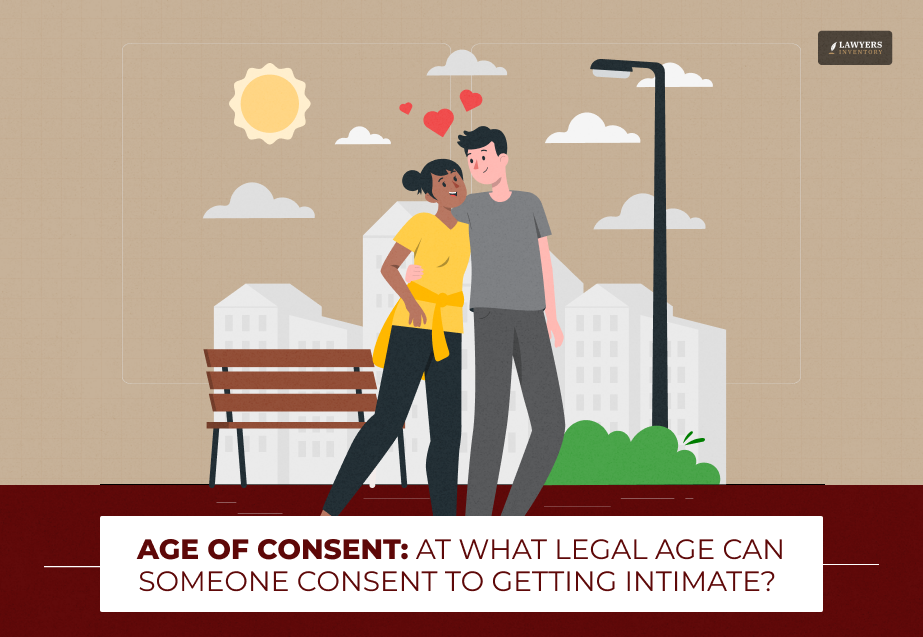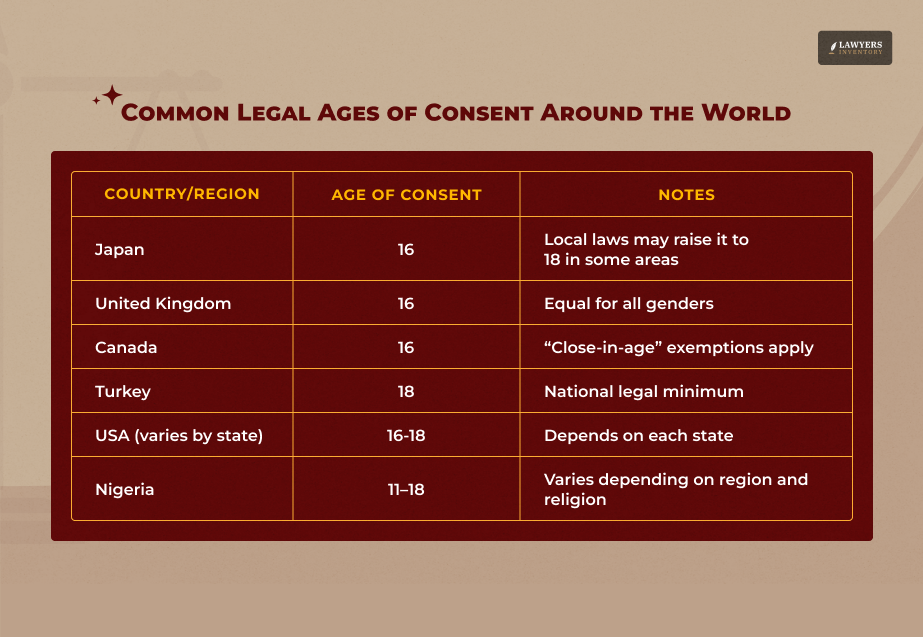
Age of consent, you might know, is about when someone is legally allowed to say “yes” to being intimate with someone else. This law helps keep young people safe from being taken advantage of.
The “age of consent” means the minimum age when someone is legally old enough to agree to sexual activity. If someone is younger than that age, then even if they say “yes,” the law does not accept it as a real “yes.”
Across the world, the rules about this age are different. Some places say 16 is okay, others say 18 or even higher.
Now, it does not take a genius to figure out that breaking these laws can lead to serious trouble. However, irrespective of this knowledge, there are people who (sometimes) don’t think much about it!
Hi. In today’s blog, I will be talking about the concept of the age of consent and its legal implications. So, if that is something you want to know, you have come to the right place.
Therefore, keep on reading this blog till the end and thank me later…
What Is The Age of Consent And Its Purpose?
What does “legal consent” mean? As I have already mentioned, it means one person freely says “yes” to something like being intimate—with no pressure, no fear, and full understanding of what it means.
Now, you might wonder what the need for this is. Why do we really have these laws? Well, the simplest answer for this is to protect young people from being tricked, forced, or hurt in relationships they’re not ready for.
But is it the same as the age to vote or drive?
No. It’s not. The age of consent is different from the age at which you can drive, vote, or drink. Those are separate rules. This is solely related to the concept of intimate relationships.
And where did these laws come from? You see, long ago, laws were based on religion or old customs. However, times have changed. The society, collectively, has evolved.
Today, they are meant to protect health, safety, and rights.
What Are The Global And National Variations In Age Of Consent?

The age of consent isn’t the same everywhere. Here’s a look at how it changes from place to place:
Examples of Variations
- Lower ages in some countries (like Japan or some Latin American nations) may reflect cultural or historical differences—but many are changing to increase protection.
- Higher ages, like in Turkey or the Middle East, show strict laws that aim to protect minors.
- U.S. Example: A 17-year-old may be legal in Texas, but in California, the legal age is 18.
Cross-Border Problems:
What if you travel to another country? Do you have to abide by the regional age of consent in that case?
You see, the answer to this is a little tricky. Even if it’s legal there, you can still get in trouble back home. Some countries (like the U.S., U.K., or Canada) can punish people for illegal acts with minors even if they happened overseas.
What Is The Age Of Consent In Same-Sex Relationships?
There are several countries where the introduction of progressive policies has made the age of consent equal for homosexual couples. However, there are some places in the world where regressive policies have made the same unequal.
For example, initially, according to the age of consent under California law, a gay man might be put on the list of sex offenders (and be treated as one) if he had an intimate relationship with a minor.
But that was not the same for heterosexual men (people in general). And this unfair and unequal treatment led to several social debates. Following this, in 2021, a bill was passed that repealed this discrepancy related to the age of consent.
What Are The Legal Consequences If You Violate The Age Of Consent?
This is probably one of the most searched topics. Yes, there are several legal ramifications that you might have to face in case you violate the laws related to this.
Let me tell you about one of them. And that’s the charges of Statutory Rape.
But what’s that?
This means someone had sex with a person under the legal age of consent—even if the younger person said “yes.”
The law doesn’t accept that “yes” because of the age. In other words, the person who you thought gave you consent did not really have the mental capacity to give you consent.
So, what happens if that’s the case? There are legal consequences. For instance, penalties could include the following:
- Jail time (sometimes many years)
- Fines
- Being labeled a sex offender for life
Romeo And Juliet Laws (Close-in-Age Exceptions)
Some laws make room for teenage couples who are close in age. These are called “Romeo and Juliet” clauses.
And what are these for? Well, as you can guess, it is to protect young people in loving, age-appropriate relationships from being punished.
Now, there are certain conditions:
- The age gap is small (like 2–4 years)
- Both are close to the age of consent
- No pressure, no force, and no big power difference (like teacher-student)
| Important: These rules are exceptions. They don’t apply everywhere and are often strict. |
Effects On Both Sides
When I was in high school, I had a friend. Unable to cope with the heartbreak, she decided to end her life. From the letter she left, her parents found out that the man promised to marry her in the future, but later broke it off.
Soon, the grieving parents filed a complaint, and (naturally) the man had to face legal consequences.
You see, any form of violation of the law, no matter who does it, affects both parties. Here’s how:
- For the Victim: Emotional trauma, shame, fear, trust issues.
- For the Accused: Legal trouble, loss of future opportunities, and long-term stigma.
What Are The Ethical And Social Dimensions Of Consent?
Apart from the fact that there can be visible wrongs, there are a few things that lie beyond the legal boundaries. And these are primarily the ethical dimensions of any such case.
“But I asked her, and she said yes!”
You see, this is something that all of us have heard from time to time. Initially, I used to think these were excuses and justifications for the wrong actions.
However, as I have grown up and am struggling with being a part of the adult world, I have realized something: these mainly stem from the lack of knowledge.
Most people are unaware of what consent really means.
What Makes Consent Real?
Even if someone is at or above the legal age, consent still must be:
- Freely given.
- Clear and enthusiastic.
- Ongoing (can be taken back any time).
- Without pressure, fear, or force.
What Affects Real Consent?
- Alcohol or drugs: Can make someone unable to say “yes” clearly.
- Fear: Saying “yes” out of fear is not real consent.
- Power imbalance: If one person has more control (like a coach or boss), the “yes” might not be true consent.
- Big age gaps: Even if legal, an older person might pressure someone younger.
Are Teens Ready to Decide?
Even if someone is legally old enough, their brain is still growing. They may not fully understand how serious or emotional intimacy can be.
Safeguarding and Seeking Support In Today’s Digital World
In today’s digital age, consent rules also apply online.
- Sending or sharing explicit pictures of anyone under 18 is illegal, even if they agree.
- Online grooming (when adults trick minors online into inappropriate relationships) is a serious crime.
- Dating apps and social media usually don’t allow people under 18 for safety.
Many young people lie about their age online, which can create legal and personal danger for everyone involved.
Ultimately, it is best to report abuse online or offline through proper channels. We all have a part to play in keeping young people safe. Here’s how you can try to help:
- Look for warning signs: There can be sudden changes in behavior and/or withdrawal or fear. Additionally, you might also notice unexplained gifts or money.
- If you suspect harm or abuse: In such cases, it is best that you talk to trusted adults. Additionally, you might contact the police, child protection agencies, or helplines.
Understanding age of consent laws helps protect young people and support healthy relationships.
But more than just following the law, we must make sure that consent is always honest, kind, and real.
Let’s all work together to make sure no one feels pressured—and that every “yes” is a true one.
Read Also:
- Live-In Relationship in India: Legal Know-Hows of a Forbidden Idea!
- What to Do If You Are Falsely Accused of a Sex Crime
- What to Do if Falsely Accused of Assault and Battery?











0 Reply
No comments yet.